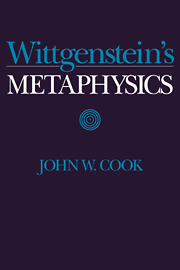Book contents
- Frontmatter
- Contents
- Preface
- List of Abbreviations
- Introduction
- Part I From Idealism to Pure Realism
- 1 Wittgenstein's Philosophical Beginnings
- 2 Neutral Monism
- 3 The ‘Objects’ of the Tractatus
- 4 The Essence of the World Can Be Shown But Not Said
- 5 What the Solipsist Means is Quite Correct
- 6 Pure Realism and The Elimination of Private Objects
- Part II The Metaphysics of Wittgenstein's Later Philosophy
- Part III Causation and Science in a Phenomenal World
- Part IV Logical Possibilities and the Possibility of Knowledge
- Part V The Past, Memory, and The Private Language Argument
- Name Index
- Subject Index
1 - Wittgenstein's Philosophical Beginnings
Published online by Cambridge University Press: 05 November 2011
- Frontmatter
- Contents
- Preface
- List of Abbreviations
- Introduction
- Part I From Idealism to Pure Realism
- 1 Wittgenstein's Philosophical Beginnings
- 2 Neutral Monism
- 3 The ‘Objects’ of the Tractatus
- 4 The Essence of the World Can Be Shown But Not Said
- 5 What the Solipsist Means is Quite Correct
- 6 Pure Realism and The Elimination of Private Objects
- Part II The Metaphysics of Wittgenstein's Later Philosophy
- Part III Causation and Science in a Phenomenal World
- Part IV Logical Possibilities and the Possibility of Knowledge
- Part V The Past, Memory, and The Private Language Argument
- Name Index
- Subject Index
Summary
Wittgenstein arrived in Cambridge in 1911 to study with Russell, having a background in engineering and no formal training in philosophy. Since 1908 he had been enrolled in the Engineering Department of Manchester University, where he had begun work on the design of an aircraft engine. His interest in this work was eventually supplanted by an interest in mathematics and the foundations of mathematics when a fellow student directed him to Russell's The Principles of Mathematics. This began a chain of events that led him to Cambridge in October 1911, where he spent the next five terms at Trinity College as Russell's student and protégé.
At Cambridge his interest in the foundations of mathematics was augmented by Russell's concern with epistemology. This was not completely new territory for Wittgenstein, for, as Anscombe reports: “As a boy of sixteen Wittgenstein had read Schopenhauer and had been greatly impressed by Schopenhauer's theory of the ‘world as idea’ (though not of the ‘world as will’); Schopenhauer then struck him as fundamentally right, if only a few adjustments and clarifications were made.” Similarly, Von Wright reports: “If I remember correctly, Wittgenstein told me that he had read Schopenhauer's Die Welt als Wille und Vorstellung as a youth and that his first philosophy was a Schopenhauerian epistemological idealism.” This is confirmed by a passage in Wittgenstein's pre-Tractatus notebooks, in which he describes his philosophical development as having begun with idealism (NB, p. 85).
- Type
- Chapter
- Information
- Wittgenstein's Metaphysics , pp. 3 - 13Publisher: Cambridge University PressPrint publication year: 1994



